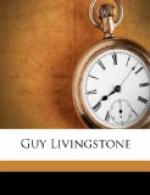Well, the race was over and the laurels lost, so we had nothing to do but pay and look pleasant, and then adjourn to the inevitable banquet at “The George.” There was little to distinguish the proceedings from the routine of such festivals. The winners stood Champagne, and the losers drank it—to any amount. The accidents of flood and field were discussed over and over again; and, I believe, every man of the twenty-three who had ridden that day could and did prove, to his own entire satisfaction, that he must have won but for some freak of fortune totally unavoidable, and defying human calculation.
About nine o’clock I went out with another man to get some fresh air, and something I wanted in the town. At the corner of every street there was a group of heavy, sullen faces, looking viciously ready for a row, while out of the windows of the frequent public houses gushed bursts of revelry hideously discordant, from the low-browed rooms where the wild Irish sat howling and wrangling over their liquor. However, we got what we wanted, and were returning, when, in a street on our left, we heard cries and a trampling of many feet. Two figures, looking like University men, passed us at speed, and, throwing something down before us, dived into an alley opposite, and were lost to sight. My companion picked up the object; and we had just time to make out that it was a bell-handle and name-plate, when the pursuers came up—six or seven “peelers” and specials, with a ruck of men and boys. We were collared on the instant. The fact of the property being found in our possession constituted a flagrans delictum—we were caught “red-handed.” It was vain to argue that, had we been the delinquents, we should scarcely have been standing there still, awaiting discovery. The idea of arguing with a rural policeman, when, by a rare coincidence, popular feeling is with him! The mob regarded our capture, exulting like the Romans over Jugurtha in chains. It was decided “we were to go before the Inspector.” We were placed in the centre of a phalanx of specials, each guarded by two regulars; and so the triumph, followed by a train that swelled at every turning, moved slowly along the Sacred Way toward the temple of the station-house, where the municipal Jupiter Capitolinus sat in his glory.
Before we had proceeded three hundred yards there was a shout from the crowd, “Look out! here come the ’Varsity!” and down a cross street leading from the inn, two hundred gownsmen, wild with wrath and wassail, came leaping to the rescue.




